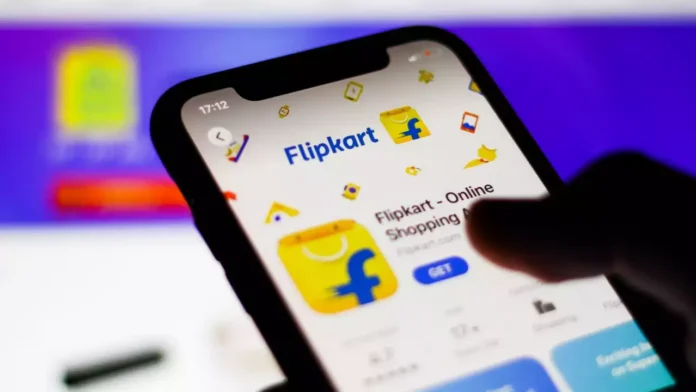Flipkart is currently on track to attain a gross merchandise value (GMV) in the range of INR 33,000 to 36,000 crore during the ongoing festive season sale, as disclosed by sources knowledgeable about the situation. This sale is expected to continue for approximately 40-45 days, extending until the celebration of Diwali in November.
After a strong start to its flagship Big Billion Days sale in early October, which exceeded expectations, the e-commerce giant owned by Walmart, has now initiated the second phase of its festive season sale, as indicated by insiders. It’s worth noting that these sales are traditionally conducted in three stages, strategically designed to contribute a substantial portion of the total annual sales during this season, helping the company maintain its market leadership position over its rival, Amazon India, for the past two years.
Flipkart’s Festive Sales:
“The start of the sale cycle has been positive, which began on October 8 and (Flipkart) should be on track to hit GMV of around $4-$4.5 billion,” said one person aware of the sales trajectory so far. This will mark an increase of up to 15-20% from the GMV recorded by the ecommerce major in 2022.
GMV, or Gross Merchandise Value, signifies the cumulative worth of products traded within an online marketplace. Flipkart generates revenue by collecting a commission on every sale, acting as the intermediary that connects merchants with consumers through its marketplace.
In addition to its primary revenue source, Flipkart also earns income through various seller services, including advertising.

Queries regarding the sales numbers were met with no response from a Flipkart spokesperson.
Both Flipkart and Amazon India, the two leading e-commerce players in the nation, have conveyed through press statements that the festive sales have commenced on a positive note. However, it’s important to note that these companies do not disclose specific individual gross sale figures for their platforms.
During the initial week of this year’s festive season sales on e-commerce platforms, GMV surged by approximately 18%, reaching approximately $4 billion, as reported by Datum Intelligence, a market research company. Datum Intelligence anticipates that the e-commerce sector will achieve a total GMV of roughly $9 billion by the conclusion of this year’s festive season.
“These (Flipkart GMV numbers) estimates are realistic and in line with market data. Flipkart is still big on smartphones, fashion and appliances — which are key segments, especially during this period,” said Satish Meena, an advisor to Datum Intelligence.
Flipkart Demands:
As per insiders, the surge in sales for Flipkart can be attributed to an increased demand for premium products in various categories, such as high-end smartphones, electronics, and appliances. This trend has been verified by at least two executives representing third-party logistics firms, based on the shipment data they’ve processed.
According to data from Counterpoint Research, sales of premium smartphones witnessed a twofold increase in online channels. Furthermore, it was revealed that 80% of the smartphones sold on Amazon and Flipkart within the initial 48 hours of the sale were equipped with 5G capabilities.
“We expect festive season smartphone sales to grow 7% YoY in volumes and 15% YoY in terms of the average selling price (ASP) this year. Smartphones, electronics & appliances and fashion are the top categories for ecommerce marketplaces,” the firm said in a note issued last Friday.
Industry executives point to a rising trend of “premiumisation” across both online and offline retail that is buoying the sector after muted sales during the first half of the year. “Although, the sluggish growth in sales of low-value items has continued in festive season sales as well,” said one person in the know.
“It is crucial for the marketplaces that new customers come in so that they are not just relying on repeat users. That would be important for the rest of the festive season as well as the full year,” a senior ecommerce industry executive said.
Flipkart Second Quarter Sales:
In July, it was reported that second-quarter sales figures indicated a decline in the volume of products priced under INR 500.
According to several industry executives, this observation highlights how a specific group of users is significantly influencing total sales, whereas the wider consumer base may not be able to contribute as substantially due to income constraints and rising inflation. In two distinct discussions, Amazon India executives have mentioned that they are witnessing a “significant shift toward premium products” across various categories.
“Fashion this year was the most affected segment throughout. Offline stores are also back in the groove now and there is a control in the inventory being released for online as well as on its pricing,” said an industry executive aware of the trends.
Insiders further noted that Flipkart’s recently introduced subscription program, VIP, has prompted higher spending by more affluent users from major metropolitan areas. These users are now engaging in a range of transactions, such as booking travel through Cleartrip, on the platform. VIP was rolled out in major cities like New Delhi, Bengaluru, and Mumbai just ahead of the Big Billion Days sale, featuring perks like next-day delivery.
Check some more exciting stories: Tic Tac and Bollywood’s Ranveer Singh in Fresh Digital Campaign
Amazon’s well-known subscription program, Prime, consistently witnesses its members spending more on the platform throughout the year in comparison to non-Prime users. Shortly following the launch of Flipkart VIP, Amazon introduced its own service called “Prime Shopping Edition,” just prior to the commencement of its flagship sales event, the Great Indian Festival. This new membership is available for INR 399 per year and offers restricted shopping-related advantages, including free shipping and one-day deliveries.
Datum’s Meena added that while repeat users from urban markets are driving the value growth, non-metro markets are playing an important role in overall volume growth. “Platforms like Flipkart, Meesho and Amazon are seeing volume growth from non-metro markets,” he said.





